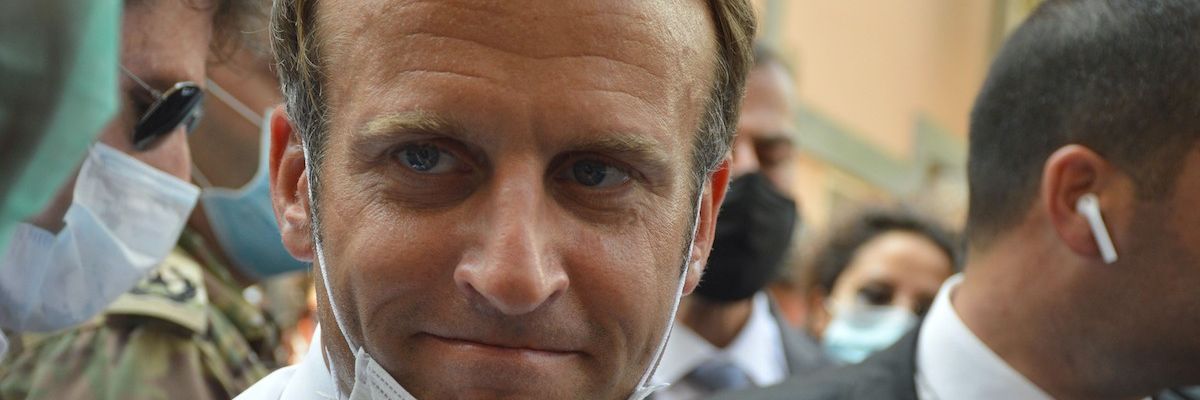As European leaders were digesting President Joe Biden’s decision to stick to his promise to withdraw from Afghanistan by September 11, a new trans-Atlantic crisis erupted: this time over AUKUS — a new trilateral security deal between the United States, the United Kingdom, and Australia.
The French contract with Australia on the supply of the nuclear-powered submarines was an immediate casualty. In response, an irate Paris went so far as recalling its ambassador from Washington in protest — for the first time in the nearly 250-year history of diplomatic relations between the two allies. Foreign minister Yves Le Drian used the kind of rhetoric usually reserved for France’s foreign foes, not its friends. Predictably, the incident strengthened the voices in favor of European “strategic autonomy” — a somewhat vague concept broadly understood to mean an ability of the EU to set its own strategic objectives and pursue them independently (of the U.S.).
French anger at being unceremoniously sidelined by supposed allies is understandable. Yet it is not clear what Paris hoped to achieve by escalating a diplomatic row with Washington. Despite the Biden administration’s rhetorical commitment to alliances, the withdrawal from Afghanistan already sent a message that the U.S. will pursue its national interests the way it, not its allies, sees fit. AUKUS is part of the broader strategy of containing China which Washington, rightly or wrongly, has defined as its top priority. Even as a Biden-Macron joint statement sought to mend the rift several days later, Washington clearly does not see France, or the EU as a whole, as central to its Indo-Pacific strategy.
Rather than waving rhetorical fists, France and the EU should finally pull themselves together, abandon the sentimental attachment to the “trans-Atlantic alliance” and put some flesh on the concept of the strategic autonomy. But in doing so, the EU has to choose its battles wisely.
Since Paris and its allies see the AUKUS as truncating their external power projection, their solution is, predictably, to double down on bolstering the EU’s military capabilities. There is already a plethora of initiatives aimed at achieving that end, such as the European Intervention Initiative and European Defense Fund. This episode will no doubt impact the work on the EU’s “strategic compass” which is expected to be unveiled sometime in early 2022, to give the EU security policy a sense of purpose and direction.
Yet for all the talk of the Indo-Pacific, the EU has so far been unable to project power where it mattered most — its immediate neighborhood. The EU-created “battle groups” were officially declared operational in 2007. Yet in Libya, for example, the EU is reduced to observing the conflicts between other actors, including Russia and Turkey, and dealing with the consequences, such as refugee inflows and the political reactions to them that threaten to undermine the very fabric of European societies.
If its strategic ambitions are to be taken seriously, the EU has to develop some capabilities to intervene in the neighborhood, but such interventions should be strictly limited to achievable goals and implemented in accordance with the international law. Seeing “strategic autonomy” narrowly through the military prism would bring the EU perilously close to repeating U.S. failures in the Middle East. Dividing the region into “bad” and “good actors,” mission creep that ultimately may involve attempts at regime change and nation-building are some of the associated risks. On top of it, the EU’s militarily most capable state, France, has a long colonial history in the region, hardly an asset in the 21st century.
A better way for the EU is to assert and enhance its main strength: economic power. With 16 percent of global GDP, the EU-27 is an economic peer to both United States and China, and far outstrips Russia. Ultimately, Europe’s continued global relevance depends on the strength of its economy. For a continent that during the last decade went through the financial crisis, euro zone crisis, and the COVID-19 pandemic, “building back better” is as relevant as it is to the United States. Agreeing on a 750 billion-euro COVID recovery plan was a necessary first step. Next should come a relaxation of the rigid fiscal rules that hobbled economic growth and fueled a populist backlash in countries like Italy, the EU’s third biggest economy. And the EU should not hesitate to use its still considerable economic power at the service of its geopolitical goals, just as the U.S. and China do.
This is because wielding economic power is as directly linked to security as are any battle groups. As an example, the EU refused to use its economic muscle to protect the JCPOA after Trump’s violations of and withdrawal from the agreement. This has led to a progressive departure by Iran from its own commitments under the pact that could ultimately destroy it altogether, creating a potentially grave security crisis that would inevitably affect Europe.
In the same vein, what AUKUS really revealed is not so much a pressing need for for the EU to build up its military capabilities and reach as it did the importance of asserting its economic power to avoid being sucked into a U.S.-led cold war with China — a course charted by outgoing German Chancellor Angela Merkel and likely to be continued by her successor, either a fellow Christian Democrat or a Social Democrat. Incidentally, the newly published results of a survey by the European Council on Foreign Relations show that most Europeans want no part of any new cold wars.
Once the dust settles over the French-U.S. spat, the EU as a whole should draw the right conclusions by building on its strengths as an economic powerhouse and avoiding the temptations of joining geopolitical or ideological battles in far-flung places for which it is ill-suited and which its citizens reject.
















